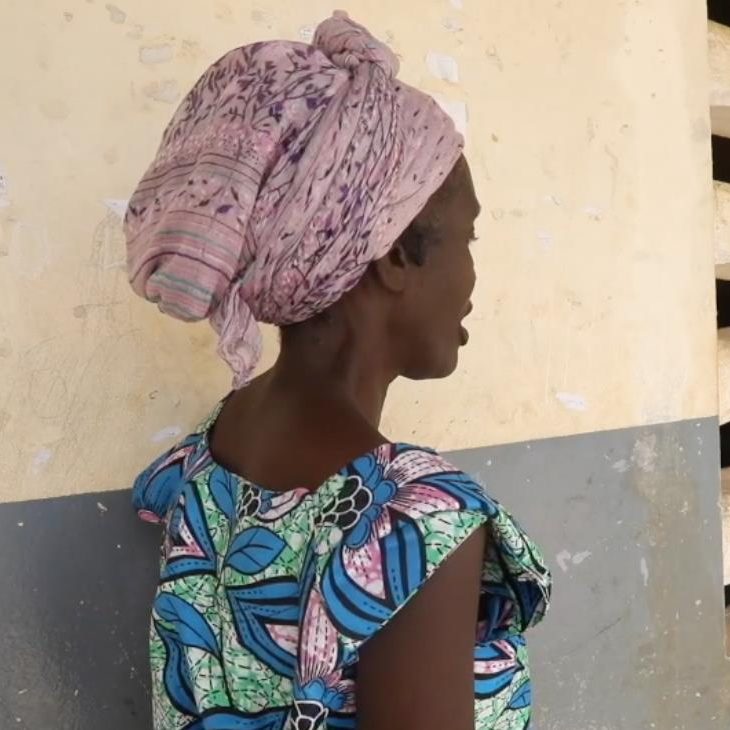The World Day for the Elimination of Violence Against Women is celebrated on November 25, in order to remember the victims of mistreatment, abuse and femicide, as well as to fight gender discrimination and inequality.
According to AVSI's experience, the only way to prevent, assist, and educate is to build a new and equal relationship between people who have been made aware of their uniqueness and their positive value.
An example is the project "Kutelema na kuniokuama ya ba kento – Let’s stand up against mistreatment towards women" in the Republic of Congo, which is supported by the European Union and realized in collaboration with a network of local organisations. This project allowed us to support Felicité, who suffered violence after being widowed.
In Congo, a woman who loses her husband loses her rights as well
Felicité is a widow, she lost her husband in 2008 and lives alone with her children in their home in Mboukou, in the rural area of Kouilou, Republic of Congo.
After her husband's death, coming back home became a nightmare. Felicité was afraid to meet her brother-in-laws and nephews who tried to prevent her from getting inside the house and chase her out. Humiliations often escalated into death threats.
In Congo, a woman who loses her husband also loses her rights.
The rites of widowhood: annihilating the woman who outlived her husband
The practices defined as rites de veuvage - widowhood rites - aim to annihilate the 'surviving' wife and cut all ties with her deceased husband and his family.
The sisters-in-law shave the widow until she bleeds, force her to undress in public and plunge into the river. She has to remain beside her husband's body until the burial, sitting on the ground, she cannot move and is allowed to go to the bathroom and eat no more than once a day. The widow is subjected to expropriation and is excluded from the inheritance. She must leave her home, along with her children, even when she had built it or lived there for years with her husband.
This is what happened to Felicité. "I was left alone, I had to take care of everything on my own. Luckily I was still able to work in the fields to get some saka-saka* to feed my son. But that could not be called life."
Having survived the rites of widowhood, Felicité had to face yet another challenge: chronic post-traumatic stomach problems and hypertension, without having access to adequate health care. Left alone by her family and now hopeless, she met AVSI-trained gender violence workers and that marked a new beginning. Felicité now knows where she can turn to for legal, medical and psycho-social support. But above all, she now knows she has a right to it.
AVSI’s fight against gender-based violence, in collaboration with the European Union
We managed to help Felicité and other women who suffered violence in the Republic of Congo through the project ‘Kutelema na kuniokuama ya ba kento – Let’s stand up against mistreatment towards women’ financed by the European Union.
The project protects the rights of women and girls who are victims of violence in the sub-prefectures of Hinda, Loango and Madingo-Kayes.
A project to fight gender-based violence with local Congolese organizations
To help women who were victims of violence, AVSI supports eight Congolese civil society organizations: thanks to EU funds, we have boosted their organizational, operative, financial and project management skills.
A key element in AVSI’s approach consists in consolidating the skills of local civil society organizations and in strengthening their synergy with service providers already present in the area. As a matter of fact, supporting local actors contributes to increase project sustainability: it prevents the undertaken projects and commitments from disappearing once the international funding ends.
Preventing gender-based violence by raising awareness
Spreading information and raising awareness play a fundamental role in the prevention of violence against women.
Access to clear, easy-to-understand information helps women become aware of their own rights: women survivors are first in line in defending and promoting women's rights, rejecting violence and systematically denouncing the perpetrators.
Therefore, within the framework of the project, AVSI promotes awareness-raising campaigns aimed at reaching at least 15,000 people by using the local language, involving community leaders and recurring to the most popular communication tool in the country - the radio.
Assistance for women who survived gender-based violence
Through this project realized by AVSI in Congo, women who suffered violence are provided with access to medical, psycho-social, and legal care in cooperation with health centers and local partners (Tayuwana Association and Reflection Group against Gender-based Violence - GRCVBG).
The goal is to support 450 women like Felicité, who can now finally imagine to have a normal life with her son. Now, she knows that she's not alone, she feels supported and understood by other women and girls who lived through similar situations. This has helped her gather the strength to denounce the violence she has suffered by taking legal action, as well as to get physical and mental care.
What's gender-based violence?
"Gender-based violence (GBV)" is any act that causes physical, sexual or mental suffering or harm, but also the mere threat of such acts, coercion and other deprivations of liberty that are perpetrated against a person's will, on the basis of their gender.
GBV is a violation of human rights and can have long-lasting physical and psychological consequences. Even though men and boys can also be victims of gender-based violence, women and girls remain the most affected.
*Saka-saka is a typical Congolese dish, made with crushed cassava leaves.










